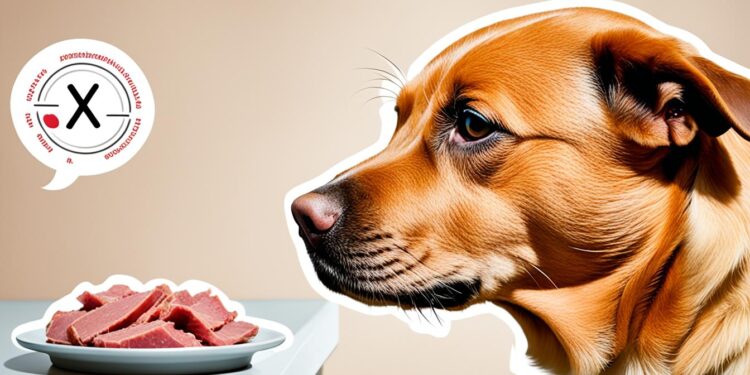Feeding Pork to Dogs: What You Need to Know

Feeding our furry friends a balanced and nutritious diet is essential for their overall health and well-being. As dog owners, we often wonder if certain foods, like pork, are safe for our canine companions. In this article, we will explore the topic of feeding pork to dogs and provide you with the information you need to make informed decisions about your dog’s diet.
Pork can be a tasty treat for dogs, but it’s important to understand the dos and don’ts of including this meat in their meals. While it is generally safe for dogs to eat plain pork, there are certain considerations to keep in mind.
First and foremost, it’s crucial to ensure that the pork is plain and free from seasoning, sauces, condiments, onions, or any other potentially toxic ingredients. These additives can be harmful to dogs and may cause digestive issues or other health problems.
Additionally, pork is high in fat, which can put a strain on your dog’s digestive system if consumed in large quantities. Therefore, it’s best to offer pork as an occasional treat rather than a regular part of their diet. As always, consulting with your veterinarian before making any changes to your dog’s meal plan is highly recommended.
When it comes to feeding pork to dogs, the cooking method is crucial. Raw or undercooked pork is not safe for dogs as it may contain trichinella parasites and harmful bacteria. These can cause trichinosis, a serious illness that affects both humans and dogs. To eliminate the risk of parasites and bacteria, pork should be thoroughly cooked before being served to your furry friend.
Lastly, it’s important to note that pork bones should never be given to dogs as they can splinter and cause choking or internal injuries. Your dog’s safety should always be the top priority when selecting treats or bones for them to enjoy.
Key Takeaways:
- Plain, unseasoned pork can be fed to dogs, but it should be kept as an occasional treat, not a staple in their diet.
- Consulting with a veterinarian before introducing pork to your dog’s diet is highly recommended.
- Raw pork is not safe for dogs and should be avoided due to the risk of trichinella parasites and harmful bacteria.
- Avoid giving pork bones to dogs, as they can splinter and cause injuries.
- Consider alternative meat options, such as cooked chicken, which may be safer and easier for dogs to digest.
Can Dogs Eat Raw Pork?
Feeding dogs a raw diet has become a popular trend among pet owners seeking to provide a more natural and nutritious diet for their furry friends. However, when it comes to pork, raw consumption poses significant risks to dogs’ health.
Raw pork may contain trichinella parasites, also known as trichinella spiralis, which can cause a potentially serious illness called trichinosis in both humans and dogs. These parasitic worms are commonly found in the muscle tissue of infected animals, including pigs.
Trichinosis can result in a variety of symptoms in dogs, including vomiting, diarrhea, lethargy, fever, stiffness, and muscle inflammation. If left untreated, trichinosis can lead to more severe complications.
To eliminate the risk of trichinosis and other potential bacterial infections, it is crucial to cook pork thoroughly before feeding it to dogs. Cooking pork at a temperature of at least 145°F (63°C) kills any parasites or harmful bacteria, making it safe for consumption.
Additionally, it is important to note that raw pork bones should also be avoided. Although bones are often considered a natural chew toy for dogs, raw pork bones can splinter and cause injuries to dogs’ digestive systems, including the mouth, throat, and intestines. Therefore, it is best to opt for safer alternatives such as edible dental bones or chew toys.
The Dangers of Trichinella Parasites
Trichinella parasites can cause trichinosis, a disease that affects the muscles in both dogs and humans. Dogs can contract these parasites by consuming raw or undercooked pork containing the larvae of the trichinella worm. It is essential to cook pork thoroughly to eliminate the risk of infection and protect your dog’s health.
| Raw Pork and Dogs | Trichinella Parasites in Pork | Cooking Pork for Dogs |
|---|---|---|
| Raw pork poses risks of trichinella parasites for dogs. | Pork can contain trichinella parasites, which cause trichinosis. | Cooking pork thoroughly is necessary to make it safe for dogs to consume. |
| Raw pork bones can splinter and cause injuries to dogs’ digestive systems. | Trichinosis can lead to vomiting, diarrhea, lethargy, fever, stiffness, and muscle inflammation in dogs. | Cooking pork at a temperature of at least 145°F (63°C) kills parasites and harmful bacteria. |
The Risks of Processed Pork and Alternative Meat Options
Processed pork products, such as bacon and ham, pose significant risks to dogs. These products are high in fat and salt, making them unsuitable for canine consumption. Feeding bacon to dogs can increase the risk of pancreatitis, a potentially serious inflammation of the pancreas. Ham, on the other hand, can lead to dehydration and bloating in dogs. Moreover, there is evidence to suggest that bacon and ham are linked to an increased risk of certain cancers in humans, emphasizing the importance of avoiding these processed pork products in your dog’s diet.
It’s crucial to be cautious about the salt content of meats and treats given to dogs. High salt intake can have detrimental effects on their health and may contribute to conditions like hypertension. Therefore, it is advisable to opt for healthier alternatives when it comes to feeding your furry friend.
One alternative meat option for dogs is chicken. Not only is chicken easy to digest, but it also provides essential nutrients that contribute to dogs’ overall well-being. During episodes of gastrointestinal issues, plain, unseasoned, boiled chicken can be a safe and nutritious option to offer your dog. Additionally, high-quality, edible dental bones and chew toys serve as safer alternatives to traditional bones, reducing the risk of dental injuries or obstructions in their digestive system.
When deciding on your dog’s diet, it is always best to consult with a veterinarian who can provide personalized guidance based on your dog’s specific needs and any potential dietary restrictions. By carefully selecting the right meats for your furry companion, such as avoiding processed pork and opting for safe alternatives like chicken, you can help ensure their health and well-being for years to come.
FAQ
Can dogs eat pork?
Dogs can eat pork as long as it is plain and free from seasoning, sauces, condiments, onions, or other potentially toxic ingredients.
Is pork a suitable staple in a dog’s diet?
Pork is high in fat, so it’s better suited as an occasional treat rather than a staple in a dog’s diet.
Should I consult with a vet before feeding my dog pork?
Yes, it is recommended to consult with a vet before adding pork to a dog’s regular diet.
Is raw pork safe for dogs?
No, raw pork is not recommended for dogs as it may contain trichinella parasites and harmful bacteria. It’s best to cook pork thoroughly before feeding it to dogs.
Can I give pork bones to my dog?
No, pork bones are not recommended as they can splinter and cause choking or internal injuries.
How much bacon and ham can I give to my dog?
Bacon and ham should be given in very small amounts as they are high in fat and salt, which can be harmful to dogs. These processed meats may also contain additives that are not healthy for dogs.
Can I give cooked pork to my dog?
Yes, cooked pork can be given to dogs in moderation, but it’s important to avoid seasoning and keep it simple.
Are there alternative meat options for dogs?
Yes, there are alternative meat options, such as chicken, that are safer and easier for dogs to digest.
Is it safe for dogs to eat raw or undercooked pork?
No, it is not safe for dogs to eat raw or undercooked pork due to the risk of trichinella parasites. These parasites can cause a disease called trichinosis in both humans and dogs.
What are the symptoms of trichinosis in dogs?
Trichinosis can lead to symptoms like vomiting, diarrhea, lethargy, fever, stiffness, and muscle inflammation in dogs.
Why is it important to cook pork thoroughly before giving it to dogs?
Cooking pork thoroughly is necessary to kill any potential parasites or harmful bacteria and make it safe for dogs to consume.
Are raw pork bones safe for dogs?
No, raw pork bones are also not recommended as they can splinter and cause injuries to dogs’ digestive systems.
Why are bacon and ham not safe for dogs?
Processed pork products like bacon and ham are not safe for dogs due to their high fat and salt content. Bacon can increase the risk of pancreatitis, and ham can lead to dehydration and bloating in dogs.
Are bacon and ham linked to any health risks in humans?
Yes, bacon and ham are linked to an increased risk of certain cancers in humans.
Why should I avoid feeding dogs high-salt meats or treats?
It’s important to avoid feeding dogs any meats or treats with high salt content.
What is a recommended alternative meat option for dogs?
Chicken is recommended as an alternative meat option for dogs. It is easy to digest and provides essential nutrients for dogs’ health.
Can I give plain, unseasoned, boiled chicken to dogs during gastrointestinal issues?
Yes, plain, unseasoned, boiled chicken can be given to dogs during gastrointestinal issues.
Are there safer alternatives to giving dogs bones to chew on?
Yes, high-quality, edible dental bones and chew toys are safer alternatives to giving dogs bones to chew on.






